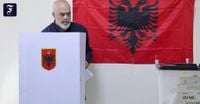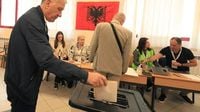On May 11, 2025, Albania held parliamentary elections that could significantly shape the country's future as it continues to pursue European Union membership. The elections are seen as a crucial test for the incumbent Prime Minister Edi Rama, who is seeking a fourth consecutive term. Polls indicate that Rama's Socialist Party is the favorite, with his main competitor being the conservative Democratic Party led by former President Sali Berisha.
The voting took place from 7 a.m. to 7 p.m., and early results from post-election surveys are expected shortly after the polls closed. Approximately 3.7 million Albanians were eligible to vote, with candidates from 40 different parties vying for a total of 140 seats in the "Kuvendi i Shqiperise," the Assembly of Albania.
Rama, who has been at the helm of the Socialist Party since 2005, emphasized the importance of EU membership during his campaign. He stated, "The doors to Brussels are the key to ensuring that all Albanians benefit from the same rights as citizens of other European countries." This message resonates with many voters who see EU accession as vital for Albania's future.
However, the election campaign was marred by intense verbal disputes between the two leading candidates. Berisha, who has been in opposition for twelve years, accused the ruling Socialists of "buying votes" and intimidating voters. Rama dismissed these allegations as mere excuses for Berisha's anticipated defeat. The political landscape in Albania has been characterized by extreme polarization, with the Organization for Security and Cooperation in Europe (OSCE) noting the heightened tensions between the parties.
Berisha, who is now 80 years old, has faced significant challenges, including corruption allegations. Since 2021, he has been barred from entering the United States and the United Kingdom due to suspicions of maintaining connections to organized crime. Despite these issues, he has positioned himself as a strong leader capable of reviving Albania's economy, adopting a campaign slogan reminiscent of former U.S. President Donald Trump: "Great Albania."
Rama's government has been accused of consolidating power and controlling key institutions, including the media. Critics argue that the media landscape is heavily influenced by the government, with many leading positions in public broadcasting filled by party loyalists. This control extends to the construction sector, where the government has been involved in numerous projects, particularly in the capital, Tirana, where avant-garde high-rise buildings have emerged.
As Albania strives for EU membership, the elections are critical. The country has been negotiating its accession to the EU for three years, and the results of this election will be closely monitored by Brussels. EU Ambassador to Albania, Silvio Gonzato, remarked, "Albania has made significant progress and demonstrated its persistence in implementing ambitious reforms for the benefit of its citizens."
For the first time, Albanians living abroad were allowed to vote by postal ballot, with nearly 246,000 registered voters in the diaspora. This move marks a significant step towards inclusivity in the electoral process.
Despite the challenges, many observers believe that Rama's Socialist Party is likely to secure a parliamentary majority once again. If successful, this would solidify Rama's position and potentially diminish the opposition's chances of regaining power in the foreseeable future.
As the election results unfold, the implications for Albania's political landscape and its aspirations for EU membership remain at the forefront of public interest. The outcome will not only determine the direction of domestic policies but also Albania's standing on the European stage.
In summary, the May 11 elections represent a pivotal moment for Albania. With a focus on EU integration and significant political rivalries, the results will be closely scrutinized by both domestic and international observers. The future of Albania's democracy and its aspirations for a European identity hang in the balance as voters make their voices heard.



